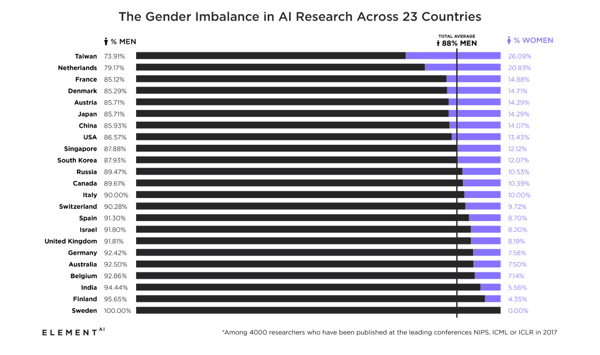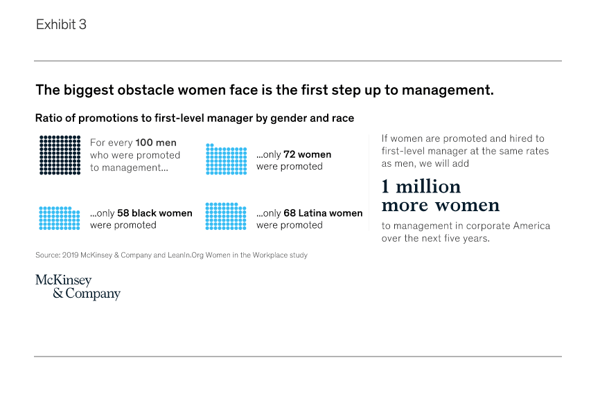The Troubling Data Points That Inspired Us To Create the Data Science For All: Women's Summit
There is plenty of discussion around the gender imbalance in technology, as well as within data science, AI, and machine learning more specifically. As we approach 2020, and prepare to take the Data Science For All: Women's Summit to two new cities (San Francisco & London), before bringing it back to New York City for a second iteration, we wanted to highlight and reflect on the troubling data points that inspired us to launch the initiative in the first place.
We first came to understand the severity of the gender imbalance problem from numerous conversations with clients who spoke to us about the difficulty around attracting women applicants to quantitative roles. From those conversations, we theorized that if we could attract women with the right backgrounds to consider data science roles, the compounding effects could be massive. So rather than focusing on the C-Suite, we made a bet on bridging the last mile with qualified early- and mid-career women.
The DS4A: Women's Summit combines applied in-person data science training, mentor-mentee matching, professional development talks and workshops, unparalleled networking opportunities, and access to a career fair with some of the world's elite employers.
The Research
According to research conducted by WIRED and Element AI, where the genders of contributors at three leading 2017 machine learning conferences were compared, only 12% of researchers were women. Without proper representation, algorithms that start out with ingrained bias run the risk of never providing fair or equitable outcomes for the people they affect. A more diverse set of creators working on these algorithms would absolutely help address this issue.

In June 2019, the New York Times published an article based on a study conducted by The Allen Institute. The study analyzed nearly 3 million computer science papers published between 1970 and 2018. The analysis used first names as a proxy for gender and found that male authors (about 475,000) outnumbered female authors (about 175,000) by almost 3-to-1.
The Allen Institute's research tracked annual activity then estimated that based on current trends, gender parity might be reached by the year 2137. According to the Times' article, the researchers behind the report also said there's a chance that parity is never reached.
In October 2019, McKinsey published their 2019 Women in the Workplace Report which suggested that "companies need to focus their efforts earlier in the pipeline to make real progress".

To quote the McKinsey report: "the biggest obstacle that women face is much earlier in the pipeline, at the first step up to manager. Fixing this "broken rung" is the key to achieving parity".
A focus on pipeline, as opposed to the C-Suite, falls in line with how we've structured the Women's Summit. Our initiative was designed to attract both working and aspiring data scientists who have the ability to transition into data science careers. Our Assessments are used to quantify and map data science skills, and have been fine tuned over the past few years thanks to 150,000+ test takers.
We were extremely excited to see the alignment between how we've structured the Women's Summit and the takeaways from The McKinsey report. A focus on the talent pipeline, training, and professional development should all help make big gender balance strides in the data science field.
Interested in nominating a Data Science For All: Women's Summit "Mentor" or sponsoring the event? Get in touch using the form below. All sponsors will have multiple opportunities to interface with these program participants throughout the month of the summit, in addition to receiving comprehensive recruitment data for all (1,000+) applicants of the program including resumes, career interests and C1 technical assessment scores.





